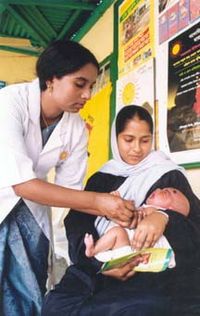
Photo from wikipedia
OBJECTIVE Primary care physicians (PCPs) are positioned to mitigate opioid morbidity and mortality, but their engagement in primary, secondary, and tertiary opioid-related prevention behaviors is unclear. The objective of this… Click to show full abstract
OBJECTIVE Primary care physicians (PCPs) are positioned to mitigate opioid morbidity and mortality, but their engagement in primary, secondary, and tertiary opioid-related prevention behaviors is unclear. The objective of this study was to evaluate Tennessee PCPs' engagement in and intention to engage in multiple opioid-related prevention behaviors. METHODS A survey instrument was developed, pretested, and pilot tested with practicing PCPs. Thereafter, a census of eligible Tennessee PCPs was conducted using a modified, four-wave tailored design method approach. Three patient scenarios were employed to assess physician intention to engage in 10 primary, secondary, and tertiary prevention behaviors. Respondents were asked to report, given 10 similar scenarios, the number of times (0-10) they would engage in prevention behaviors. Descriptive statistics were calculated using SPSS version 25. RESULTS A total of 296 usable responses were received. Physician intention to engage in prevention behaviors varied across the 10 behaviors studied. Physicians reported frequently communicating risks associated with prescription opioids to patients (8.9 ± 2.8 out of 10 patients), infrequently utilizing brief questionnaires to assess for risk of opioid misuse (1.7 ± 3.3 out of 10 patients), and screening for current opioid misuse (3.1 ± 4.3 out of 10 patients). Physicians reported seldomly co-prescribing naloxone for overdose reversal and frequently discharging from practice patients presenting with an opioid use disorder. CONCLUSIONS This study noted strengths and opportunities to increase engagement in prevention behaviors. Understanding PCPs' engagement in opioid-related prevention behaviors is important to effectively target and implement morbidity and mortality reducing interventions.
Journal Title: Journal of opioid management
Year Published: 2022
Link to full text (if available)
Share on Social Media: Sign Up to like & get
recommendations!